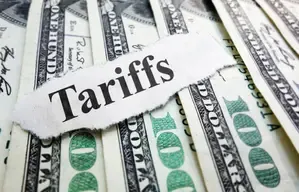India Less Affected by Trump Tariffs Compared to Global Counterparts: Industry Insights

Synopsis
Key Takeaways
- India's export competitiveness to the US is relatively intact.
- Trump's tariffs may lead to a realignment in global trade.
- Collaboration with the government is vital for Indian industries.
- India retains a tariff advantage over Asian competitors.
- High-exposure sectors may benefit from the new tariffs.
New Delhi, April 3 (NationPress) With the announcement of reciprocal tariffs by US President Donald Trump affecting numerous countries including India, industry analysts indicated on Thursday that India's export competitiveness in the US market is relatively less impacted than that of other global competitors.
The tariffs introduced by Trump are expected to lead to a significant restructuring of global trade and manufacturing supply chains.
Assocham President Sanjay Nayar commented, "India is positioned at an average tariff rate of 26 percent, alongside a 10 percent baseline duty, which requires evaluation for its true effect."
"Overall, it seems that India's export competitiveness to the US remains relatively intact. However, our industry must strive to enhance export efficiency and value addition to lessen the impact of these tariffs," he added in his statement.
Given that many of America's trading partners are set to impose reciprocal tariffs, no single country gains a distinct advantage, and consumers might face higher prices, leading to inflationary pressures.
"While we observe global reactions, a swift preferential trade agreement could be beneficial for India, especially considering President Trump’s respect for Prime Minister Narendra Modi's leadership," Nayar remarked, noting that India Inc will collaborate closely with the government on this issue.
Economist Arsh Mogre from PL Capital Institutional Equities Research stated that the US's implementation of a 26 percent uniform tariff on Indian exports signifies a crucial strategic shift towards bilateral trade and the decline of multilateralism. This move is less about protectionism and more about a high-stakes trade negotiation.
“Although the immediate consequences on India’s $75–78 billion exports to the US are significant, the disruption varies across sectors and is somewhat mitigated by India’s emerging relative tariff advantage over Asian peers,” he added.
For sectors with high exposure such as textiles, footwear, and electronics, this change could paradoxically boost India’s competitiveness in the evolving post-China+1 global sourcing scenario, where Vietnam, Cambodia, and Thailand are now facing tariffs that are 10–20 percentage points higher.
Furthermore, in industries like auto components, chemicals, and electronics, India continues to show cost resilience compared to China, which is now faced with a daunting effective tariff wall of 54 percent, Mogre remarked.










